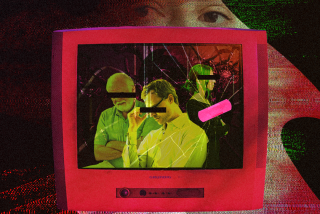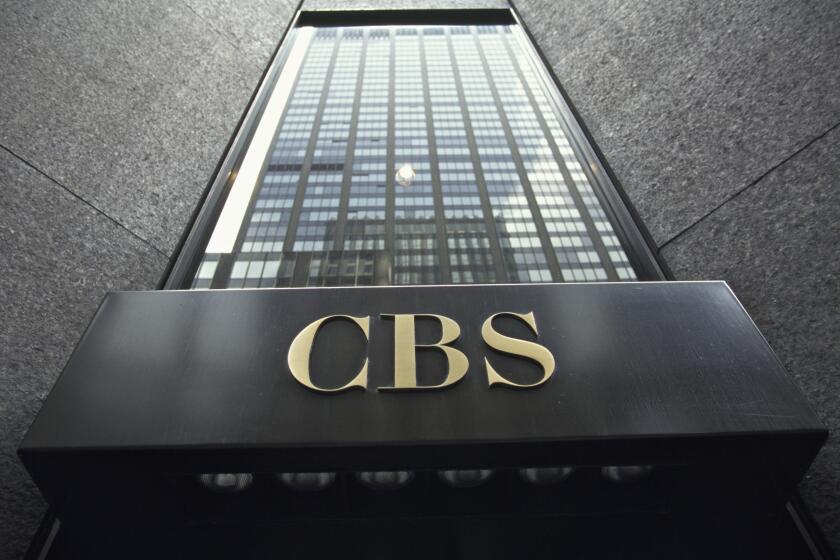Another Battle of TV Diversity Rages in France
- Share via
PARIS — Dieudonne Mbala, one of France’s most popular black comedians, recently turned down an offer to do a TV commercial for a brand of cocktail peanuts.
“Peanuts,” objected Dieudonne, “are food for monkeys.”
The 33-year-old comic, child of a French mother and a father from the African nation of Cameroon, didn’t press to learn what was in the sponsor’s mind. But he worried that the spot, one of the few in which a French man or woman of color would figure, might become video reinforcement for racial stereotypes. For in France, though TV broadcasts are in color, the faces on the screen are almost always white.
“Television reflects something dramatic in society: the total failure of racial integration in France,” said Alain Remond, editor in chief of Telerama, the brainiest of French magazines about television. “There is a kind of de facto segregation against people of color. Each time there are debate programs about problems in our society, you’ll never see a black judge, a black doctor, a black sociologist, a black psychologist. Yet walk through a French hospital, for instance, and you see black doctors. They’re just not on television.”
The complaint is strikingly similar to the U.S. protest over the lack of leading roles for minorities on network television.
Turn on TV any evening in Paris or Perigueux, and on the three leading national channels--with the notable exception of music and sports, and leaving out U.S. imports--France seems to be of a monotonous hue. Black regulars on locally produced series can literally be counted on one hand--the most prominent play sidekicks to the leads on two popular police shows, “Navarro” and “Julie Lescaut.”
Though the French population of 60 million may include 6 million to 7 million people of color (estimates vary since race is not considered a proper question for the national census), television news studios also remain virtually all-white preserves. In all of France, regional stations included, there are five TV news presenters and reporters of non-European stock. It’s a striking contrast with Britain, where one of the most popular anchors is from Trinidad and Tobago.
When Calixte Beyala, a Cameroon-born novelist who now lives in France, pitched an idea seven years ago for a TV series about a black policewoman, the initial reception, she recalls, was encouraging. After two years of efforts on the program, to be called “Inspector Rosette,” she says she pulled out. TV magnates had decided that many more viewers would watch if the detective were a blue-eyed blond, Belaya said, so they wanted to amend the project. The author refused, and the project died.
“When you have children, they come home from school and one of the first things they do is to turn on the TV,” said Beyala, 39, who has a son and daughter. “And they will grow up through the models that they see. Blacks have no role models in France. The only model they have is to be a long-distance runner, an athlete or a musician.”
Protest Group Files Discrimination Suit
Irked at the dearth on the country’s airwaves of faces from France’s Caribbean islands, former African colonies and immigrants from both regions, a small but vocal organization of French blacks, Collectif Egalite, has begun a series of protest actions. Recently, it filed a discrimination suit with the Paris public prosecutor.
“All blacks--children that come from rather bad neighborhoods, as I do, my own children--can identify now only with American blacks” is how Dieudonne, a father of three, sums up the state of affairs. “They are the only ones you can see on television.”
Collectif Egalite has called for a boycott of companies that sponsor programs on the country’s most-watched channel, TF1, which is owned by a large construction company and maker of concrete. In two recent instances, Dieudonne said, mentions of the boycott were edited out of televised interviews he and Beyala gave.
Ironically, little more than a year ago the same television channels in France were filled with a joyful celebration of the country’s increasing diversity and multiethnicity. The spark was the unexpected victory of a motley national team--made up of whites, blacks, Arabs, Frenchmen of native stock and offspring of immigrants--in the World Cup soccer championship.
That multihued, multiorigin ethnic cocktail, it seemed to many, was a trump card for France and a formula for success across the board. It was the dashed hopes from this feeling of national communion that led, in large part, to the founding of Collectif Egalite by Beyala, Dieudonne and others in December.
“We want there to be a better representation--more hosts of programs, more journalists, more documentaries about Africa, about blacks, more TV movies where blacks are present and play something other than the role of houseboy or chambermaid,” Beyala said.
She insisted that quotas be devised and imposed to give blacks a more high-profile presence on air--a demand some other member of Collectif Egalite don’t share.
Members of France’s black population, as a rule, are poor, lesser educated and more likely to be out of work than whites, and are badly fractured as to continent and country of origin. It is a measure of the black community’s relative isolation that when representatives met recently with an American reporter, leaders of Collectif Egalite were unaware of similar protests in the United States over the lack of leading roles for minorities in the 26 new comedies and dramas that premiered this fall on the major U.S. networks.
“We are at the stage American blacks were 40 years ago,” Beyala said.
But the Collectif has definitely gotten the ear of the powers that be. Last month, France’s equivalent of the Federal Communications Commission gave Beyala, Dieudonne and other leaders of the group a full-dress hearing and agreed immediately that French television is not representative of the country’s diversity. The Paris-based High Audiovisual Council, which supervises programming and allocates broadcast frequencies, commissioned a study on how television does and doesn’t depict the country’s minorities, and another on how policies could be altered.
Council President Herve Bourges has said TV stations might be obligated in the future to “reflect the diversity of origins of the French population and the pluricultural aspect of the French-speaking world.”
’ But trying to change things with a new law, or by fixing quotas as Belaya demands, would be ticklish if not impossible. For as Bourges reminded the visitors from Collectif Egalite, legislated affirmative action is excluded because France’s Constitution stipulates the equality of all citizens “without distinction as to origin, race and religion.”
Beyala sees that egalitarian argument, which has its roots in the credo of the French Revolution, as a legal escape hatch for doing nothing.
“The person who spouts this philosophy is a white man, if possible blond and with blue eyes,” she said. To protest the state of French television, she has stopped paying the annual tax the government assesses on households to finance the other two major stations, which are publicly run.
“This TV is not meeting my needs or those of my people,” she explained.
According to Dieudonne, French television still prefers “happy, laughing Negroes” or smiling, flower-bedecked musicians from the French West Indies playing feel-good music. For the almost wholly white executive caste that runs broadcasting here, contended the comedian, “sharing power is something difficult, something impossible.”
According to one study on the French television news, the belief remains widespread among broadcasting executives that a large part of the viewing public would tune out in droves if there were more nonwhite anchors or reporters. Dieudonne recalled meeting one TV executive several years ago who reportedly told him that “a black on TV drives down the Audimat [ratings].”
But the comic thinks the French are a lot more tolerant than they are being given credit for by many broadcasters.
“That TV executive, he must think nobody in France watches a Mike Tyson fight,” Dieudonne joked.
More to Read
The complete guide to home viewing
Get Screen Gab for everything about the TV shows and streaming movies everyone’s talking about.
You may occasionally receive promotional content from the Los Angeles Times.






